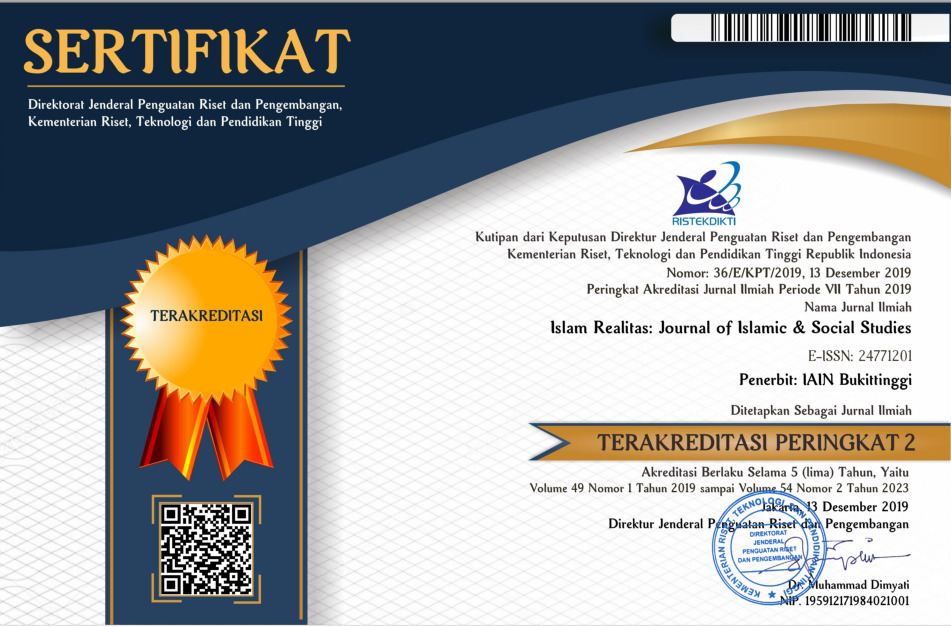Al-'Ilm Al-udhri: Philosophical Epistemology and Sufism Common Ground
DOI:
https://doi.org/10.30983/fuaduna.v7i2.7348Keywords:
Epistemology, Philosophy, Al-'Ilm Al-Ḫudhūri, Mukasyafah, SufismAbstract
This article investigates the possibility of finding common ground between philosophy and Sufism. It aims to answer whether these two can converge on an epistemological level. The discourse of al-'ilm al-ẖudhūri was used to answer this question. The main source for this article's study is the works of Mulla Sadra and Suhrawardi, which are analyzed descriptively with a philosophical approach. This article concludes that al-'ilm al-ẖudhūri is a form of real knowledge obtained by individuals directly from God without needing mental representation or linguistic symbolism. This knowledge is spiritual, not sensory-rational. Mulla Sadra and Suhrawardi believe that the only way to obtain this knowledge is through spiritual observation by practicing Sufism, which involves the rites of mujahadah and riyadhah.
References
Abdullah. (2013). Ilmu Huduri dan Kesadaran Kesatuan Mistikal: Tinjauan Kritis atas Pemikiran Mehdi Ha’iri Yazdi. Sulesa, 8(1), 15–23.
Al-Anshari, A. (2007). Manazil as-Sa’irin. Maktabah Ats-Tsaqafah Ad-Diniyyah.
Al-Jurjani, S. ’Ali bin M. (2012). Al-Ta’rifat. Dar al-Kutub al-Islamiyyah.
Al-Jurr, H. A.-F. and K. (2014). Riwayat Filsafat Arab Jilid 1. Sadra Press.
Al-Qaishari, D. (1382). Syarh Fushush al-Hikam. Tablighat Islami hauzah ‘Ilmiyyah.
Al-Qusyairi, A. Q. ’Abd al-K. bin H. (2011). Al-Risalah al-Qusyairiyyah fī ’Ilmi Tashawwuf. Dar Al-Kutub al-Islamiyyah.
Al Walid, K. (2020). Husuli dan Huduri dalam Konteks Filsafat Hikmah Muta’aliyyah. JURNAL YAQZHAN: Analisis Filsafat, Agama Dan Kemanusiaan, 6(2), 163. https://doi.org/10.24235/jy.v6i2.7117
Bagir, H. (2018). Epistemologi Tasawuf: Sebuah Pengantar. Mizan.
Darmawan. (2020). Validitas Takwil Sufi: Studi Analisis Kitab Ta’wilat Al-Qur’an al-Hakim. Haura Publishing.
Drajad, A. (2005). Suhrawardi: Kritik Falsafah Paripatetik. LKIS.
Ellwood, C. A. (1969). A History of Social Philosophy. AMS Press.
Gharawiyan, M. (2012). Pengantar Memahami Buku Daras Filsafat Islam, Penj. Muhammad Nur Djabir. Shadra Press.
Hejazi, S. M. R. (2010). Al’Ilm al-Huduri Knowledge by presence anepistemological bridge between Philosophy and Mysticism. Isra Academy Press.
Ibn ’Arabi, M. al-D. (2011). Al-Futuhat al-Makkiyyah (4th ed.). Dar Al-Kutub Al-’Ilmiyyah.
Ibn Arabi, M. (n.d.). Fushûsh al-Hikam. Dar al-Kitâb al-‘Arabi.
Ibn Faris, A. al-H. A. (1994). Mu’jam maqayis al-lughah (3rd ed.). Maktabah al-A’lam al-Islami.
Maulana. (2019). Peran Ilmu Hushuli dan Hudhuri dalam Membuktikan Keberadaan Tuhan. Cross-Border, 2(2), 274–284.
Mufid, F. (2012). Epistemologi Ilmu Hudhuri Mulla Shadra. Alqalam, 29(2), 215–135.
Russel, B. (2002). Sejarah Filsafat Barat. Pustaka Pelajar.
Sabdri, M. (2017). Mengurai Kesenyapan Bahasa Mistik: Dari Analitik ke Epistemologi Hudhuri. Kencana.
Saidurrahman. (2014). Ilmu Huduri Khazanah Epistemologi Islam. Jurnal THEOLOGIA, 25(1), 99–120. https://doi.org/10.21580/teo.2014.25.1.339
Shadra, M. (1981). Al-Hikmah al-Muta’aliyah fi al-Asfar al-’Aqliyyah al-Arba’ah (6th ed.). Dar Ihya’ al-Turats al-‘Arabi.
Subhani, J. (1991). Nadzhariyat al-Ma’rifat. Markaz al-Alami li al-Dirasat al-Islamiyah.
Thabathaba’i, M. H. (1415). Bidayah al-Ḫikmah. Muasasat Nashr al-Islami.
Walid, K. Al. (2023). Manusia: Upaya Memahami Kreasi Tuhan yang Paling Sempurna. Nuralwala.
Yazdi, M. H. (1992). The Principles of Epistemology in Islamic Philosophy: Knowledge by Presence. State University of New York Press.
Downloads
Published
How to Cite
Issue
Section
Citation Check
License
Copyright (c) 2023 Kholid Al Walid, Darmawan Darmawan, Ni'mah Umm Hani D. Barra, Nurul Ain Norman

This work is licensed under a Creative Commons Attribution-ShareAlike 4.0 International License.
Authors who publish with this journal agree to the following terms:
- Authors retain copyright and grant the journal right of first publication with the work simultaneously licensed under a Creative Commons Attribution-ShareAlike 4.0. that allows others to share the work with an acknowledgment of the work's authorship and initial publication in this journal.
- Authors are able to enter into separate, additional contractual arrangements for the non-exclusive distribution of the journal's published version of the work (e.g., post it to an institutional repository or publish it in a book), with an acknowledgment of its initial publication in this journal.
- Authors are permitted and encouraged to post their work online (e.g., in institutional repositories or on their website) prior to and during the submission process, as it can lead to productive exchanges, as well as earlier and greater citation of published work (See The Effect of Open Access).





